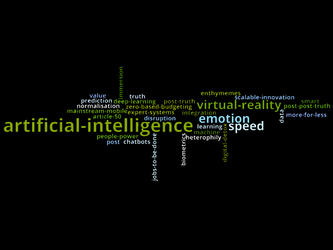2016 Review: the biggest success stories
TRUMP/ BREXIT
"Political Improvisation. Has Donald Trump ushered in an era of improvisation? The battle between the slick, professional, metropolitan elite and the anti-professional class where off-the-cuff, human, authentic and transparent values is being played-out in other arenas," Joe Staton, client services lead, GfK market opportunities and innovation.
"I suppose Trump is the obvious answer. A reminder of the effectiveness of brutal, analogue connection. Everybody has a plan until they get hit," Matt Lynch, chief strategy officer, Big Sofa.
"Regardless of your political point of view, the biggest campaign success stories have to be Brexit in the UK and Trump in the US. They both identified and successfully spoke to a section of society that was not motivated by traditional political views or opinions, by developing a campaign language that resonated," David Day, Global CEO & president, Lightspeed.
"The low trust, anti expert narrative – we saw this with Brexit, with Trump, and with Strictly and X factor too," Deborah Mattinson, founder director, Britain Thinks.
"I think that anything with a sense of authenticity at its core. In some ways 2016 was about trust and we increasingly feel we can only trust things which are apparently authentic even though they may be flawed. From Ed Balls on Strictly to the rise of populist politics," Colin Strong, global head of behavioural science, Ipsos.
POKEMON GO
"Pokemon Go – The app that generated thousands of news stories, blitzed our social media feeds and had grown adults trespassing into people’s gardens also found the most successful use of augmented reality seen so far," Christian Dubreuil, managing director EMEA, Research Now.
"Pokemon Go demonstrated the power of fun, nostalgia and augmented reality," Will Galgey, UK CEO, Kantar TNS.
science
"The contribution of neuroscience to the advertising industry. From the demonstration, through implicit testing, of the value of showing fatty foods, to measuring the difference between what people say vs what they mean, neuroscience techniques are imperative to the future of the brand-human connection," Jane Rudling, managing director of Marketing Sciences Unlimited
"We’re finally seeing behavioural economics being fully embraced into the vernacular of a researcher –there’s a long way to go but having something to put some ‘science’ behind our common sense somehow just adds credibility and allows us as an industry to influence and sound credible at a much higher c-suite level," Anna Cliffe, joint managing director, Trinity McQueen.
Check back tomorrow for our panel’s thoughts on 2016’s biggest disappointments

We hope you enjoyed this article.
Research Live is published by MRS.
The Market Research Society (MRS) exists to promote and protect the research sector, showcasing how research delivers impact for businesses and government.
Members of MRS enjoy many benefits including tailoured policy guidance, discounts on training and conferences, and access to member-only content.
For example, there's an archive of winning case studies from over a decade of MRS Awards.
Find out more about the benefits of joining MRS here.














0 Comments